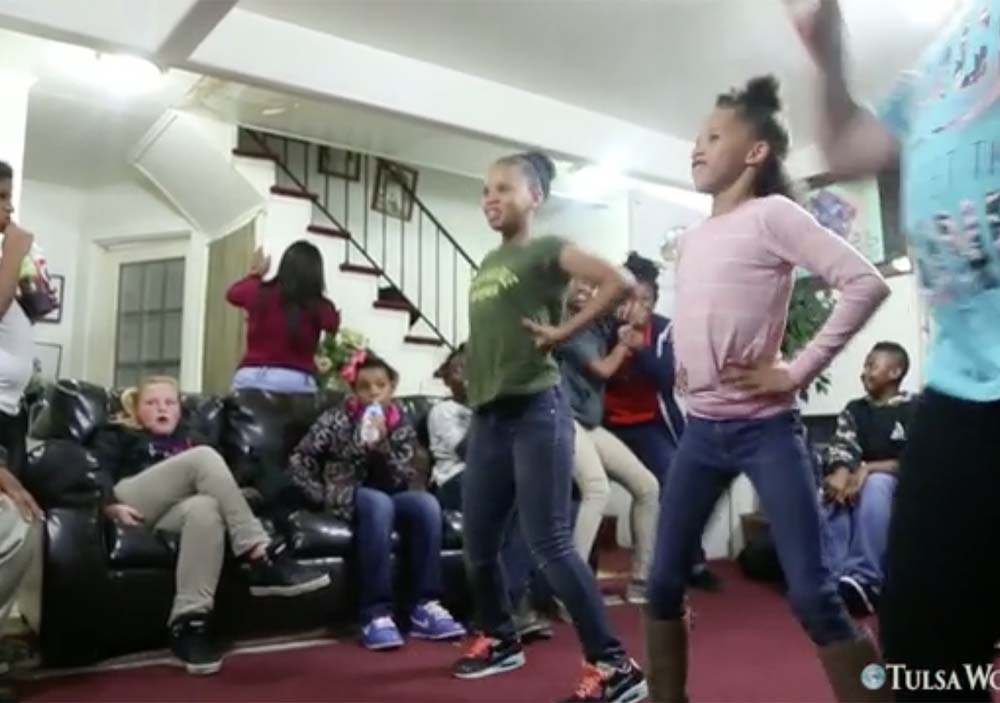Unsung heroes: Lester Shaw
Shaw runs an arts-based outreach program in north Tulsa. MATT BARNARD/Tulsa World
SOURCE: TULSA WORLD
Tulsa native Lester Shaw saw the arts leaving schools, and he saw students leaving with them.
For 13 years, he worked on after-school programs with a local nonprofit in low-income housing communities, but grant funding was set to expire.
That had happened before. He was moved to another area of the city to another grant-funded program, away from his north- and west-side neighborhood kids.
“I lived in the neighborhood and kids would see me and ask ‘Mr. Lester, Mr. Lester, where’d you go?’ They were used to people coming into their lives, saying do this or that, then leaving,” Shaw said. “I wanted to be consistent in their lives.”
That was the impetus for him to start A Pocket Full of Hope. In the spring, it is going to move into a new a facility the group has revived that’s connected to north Tulsa’s musical history.
The nonprofit Shaw started as an arts program 15 years ago has become much more. There are music, theater, dance and film productions and also lessons in life skills, social responsibility and leadership. A reading program and connections to academic support are available.
The agency’s name came from one of Shaw’s graduate classes. A speaker described pockets of poverty and pockets of despair.
“I wondered, ‘Where are the pockets of hope?’ I knew the answer. I knew these kids. I work with these kids, so that is the name,” Shaw said.
Shaw graduated from Booker T. Washington High School in 1975 and earned a bachelor’s degree in music from Allen University in Columbia, South Carolina. He completed his master’s degree in counseling at the University of Oklahoma and completed a doctorate in education from Oklahoma State University.
His research area has been in different learning styles. He teaches at-risk children and teenagers about their unique way of learning.
It appears to be working — 100 percent of the youths who have been active participants in his program have graduated high school. It’s not a simple — or cheap — formula.
“When kids are told to go to school and get an education, you’d be surprised how many don’t know what that means,” Shaw said. “We create a pathway to show kids how they get to high school graduation.”
Part of the approach is recognizing a student’s obstacles. Many have a parent in prison or have home situations where they are functioning as an adult.
Every spring break, the youths in Shaw’s program go on a trip to see the world outside their neighborhoods.
There have been many journeys to the surrounding states. They have gone to Atlanta to visit the Martin Luther King Jr. National Memorial and check out a few of the city’s universities. They went to New York City to see the Apollo Theater and other national historical sites.
“They are transformed by this,” Shaw said.
“We use this as a way to empower them and see beyond their present existence. Many have never been outside Oklahoma.”
When the arts were cut after schools faced slashes in funding, Shaw noticed many of the dropouts had talent in these areas. With no encouragement or nurturing of their interests, they have little reason to stay in school.
“If we allow them to be successful in something they are passionate about, then they will have the courage to do something else,” Shaw said. “Here, we let them lead. We don’t have the standards of traditional school hanging over us. We give them the freedom to lead, live, be and grow.”
In 2008, the nonprofit bought the property of the former Big 10 Ballroom, 1624 E. Apache Ave., to operate its own theater and provide more space for programming.
The structure was built in an art deco streamline style in 1948 by Lonny Williams, the second black officer on the Tulsa police force. The ballroom became a stop on the “chitlin circuit,” which included venues in the South, Midwest and eastern states that were considered safe for African-American performers.
Among the artists who performed at the Big 10 Ballroom were the original Temptations, Ella Fitzgerald, Ray Charles, Fats Domino, Little Richard, B.B. King, Ike and Tina Turner, Count Basie and James Brown.
The ballroom fell into disrepair for decades after closing in the mid-1960s. A Pocket Full of Hope bought it in 2008 and, after years of raising money for renovation, it is scheduled to open in the spring.
“This is the restart of a new facility in our community,” Shaw said. “The kids can’t believe some of these artists were anywhere near Tulsa. We are empowering young people with a historical perspective of their community. They are going to connect with their history.”
Ginnie Graham 918-581-8376
ginnie.graham@tulsaworld.com

